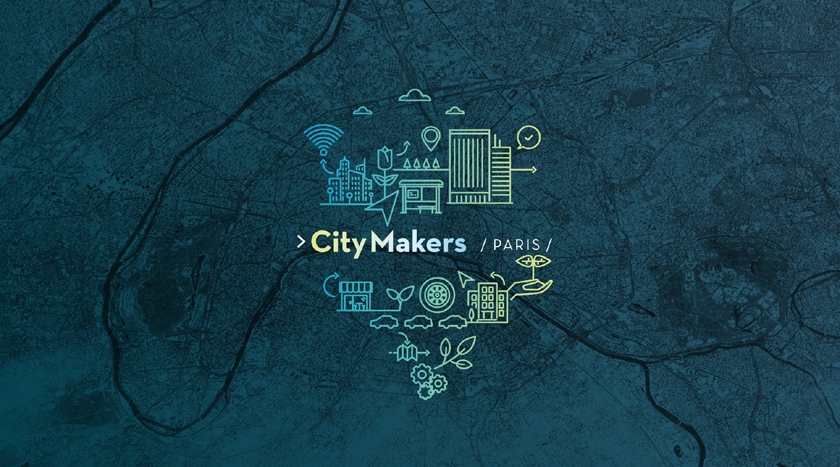CityMakers : an open innovation program to accelerate the transition toward a flexible and sustainable urban mobility
The fast urbanization rate raises multiple issues for cities and citizens, including the efficiency of transportation networks. In April 2017, Groupe Renault, NUMA and their partners launched CityMakers, which brings together startups, experts, and public and private stakeholders to develop solutions. Its objective: to simplify citizens’ urban mobility and accelerate the transition toward more flexible and sustainable urban transit.
In June 2017, CityMakers’ partners introduced 6 challenges, which could lead to one or more experiment, and called startups to join them in this adventure. Challenges addressed subjects related to the optimization of the infrastructure for electric vehicles in the city, the improvement of road maintenance or the development of multimodal mobility solution in the workplace, for example.
On September 28, 9 start-ups were selected among many candidates to meet these challenges with program partners and many experts. After 3 months of experiments, during which partners and startups, supported by NUMA, developed and tested innovative mobility solutions together in Paris, the CityMakers teams presented the results of their collaboration yesterday.
6 challenges and 9 innovative urban mobility solutions
Challenge #1 – Improve the car-sharing experiences with additional services
OuiCar, AXA, RCI Bank and Services and Groupe Renault have focused on understanding practices related to peer-to-peer car rental. Two phases of studies, quantitative and qualitative, made it possible to identify the expectations and needs of owners (especially of new vehicles’ owners) and to determine the best way to promote the availability of their vehicle on car-sharing platforms.
Challenge #2 – Offer an interactive and immersive information to passengers in a vehicle
With Groupe Renault and the City of Paris, Persistant Studios imagined the car as interactive media by rethinking the interaction between the interior of the car and its external environment with the objective to make the journey a time of discovery. They developed and tested different types of experiences and content to be consumed within the car. A very useful test to imagine autonomous vehicles’ services of tomorrow.
Challenge #3 – Simplify the use of different means of transport while travelling in Ile-de-France
Using its travel-tracking technologies and multi-source data analysis, Geo4Cast has provided a better understanding of the behavior of the employees of Nissan’s headquarters and AXA based in the Ile-de-France region in order to offer 7 solutions to optimize their mobility in accordance with energy transition objectives. These optimization solutions included remote working, carpooling and the replacement of company cars with "mobility passes". For each of these scenarios, travel time and budget savings for employees and companies were measured.
Karos tested its carpooling application with RCI Bank and Services’ employees on a specific site. This experiment was an opportunity to raise awareness on new mobility solutions among employees, and made it possible to create new transportation practices reducing travel time and simplifying itineraries. During the trial, employees of the site gained an average of 24 minutes and an increase in purchasing power of €6 per trip. In total, the equivalent of 345 kg of CO2 has been saved during the experiment.
Challenge #4 – Promote the deployment of electric vehicles and their infrastructure in urban areas
When it comes to the electric vehicle, incentives, benefits related to traffic or parking are multiple and vary in time and by region. It is not always easy to access this information in a clear, fast and reliable way. Toucan Toco and Groupe Renault have developed a platform helping future buyers to project themselves in their electrical vehicle experience: daily or holiday charging and parking, set up of a terminal, impact on budget, models available on the French market, environmental impact, received ideas, etc.
Dalberg Data Insights, Groupe Renault and the City of Paris have developed another platform bringing together data from Groupe Renault and the City of Paris on electric vehicles’ uses and load infrastructures. This platform provides a dynamic visualization of behaviours and the impact of electric vehicles in Paris, and makes it possible to relevantly deploy the required infrastructure or incentives to increase the acquisition of electric vehicles.
Challenge #5 – Improve mobility services or create new ones thanks to data generated by unused cars
In France, looking for parking spaces is responsible for 5% to 10% of congestion in urban areas. AppyParking, Nissan, and RCI Bank and Services have tested solutions to solve this problem. Already operating in London, the prototype of AppyParking provides a quick and easy solution to identify free parking spaces and a payment procedure more adapted to the real time parked thanks to the geolocation of vehicles and available parking spaces. This was studied in the Marais district in Paris.
Nissan and RCI Bank and Services have also worked with Ellis Car to better understand behaviours of professional vehicle drivers to improve infrastructure and behaviour in a highly personalized way (based on recurring driving risks) through data collected via telematics and/or smartphones. Continued work on this solution can help reduce the risk of accidents in all professional fleets.
Challenge #6 – Use car data to provide a predictive road maintenance tool
Logiroad, a decision-support software publisher in the field of maintenance and operation of road networks, has tested the reliability of Renault’s car sensor on Paris roadways to assess the quality of road safety and to accurately geolocate defects such as potholes. By linking this sensor to the Logiroad database, they developed a solution that offers local authorities the possibility to access objective information about the state of the road in real time and at a lower cost, thus making road maintenance and traffic more fluid while reducing the maintenance budget.
https://www.projekt-renault.de/index.php/renault/news-renault/item/1178-groupe-renault-numa-and-their-partners-present-the-results-of-the-first-edition-of-citymakers?tmpl=component&print=1#sigProGalleriab4f3af7236

